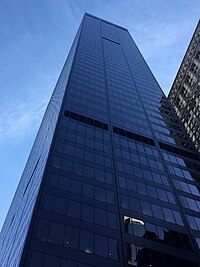| 140 Broadway | |
|---|---|
 The western facade viewed from the ground in February 2023 | |
 | |
| Alternative names |
|
| General information | |
| Status | Completed |
| Architectural style | International Style |
| Location | 140 Broadway Manhattan, New York 10005 U.S. |
| Coordinates | 40°42′31″N 74°00′36″W / 40.70861°N 74.01000°W |
| Construction started | 1964 |
| Completed | 1967 |
| Owner | Union Investment |
| Height | |
| Roof | 688 ft (210 m) |
| Technical details | |
| Floor count | 52 |
| Floor area | 111,805 m2 (1,203,460 sq ft) |
| Design and construction | |
| Architect(s) | Gordon Bunshaft (Skidmore, Owings and Merrill) |
| Structural engineer | James Ruderman |
| Designated | June 25, 2013 |
| Reference no. | 2530 |
140 Broadway (formerly known as the Marine Midland Building or the HSBC Bank Building) is a 51-story International Style office building on the east side of Broadway between Cedar and Liberty streets in the Financial District of Manhattan in New York City. The building was designed by Gordon Bunshaft, of the firm Skidmore, Owings & Merrill, and consists of a mostly smooth black facade on a trapezoidal plot. It is approximately 688 feet (210 m) tall, with approximately 1.17 million rentable square feet (109,000 m2). It is known for the distinctive sculpture at its entrance, Isamu Noguchi's Cube.
The developer Erwin S. Wolfson acquired the site in several stages between 1952 and 1961. Initial plans called for a 36-story monolith, but when Wolfson died, the architects modified their plans to a 51-story tower, which occupied only two-fifths of the block and conformed to the 1961 Zoning Resolution. The building was erected between late 1964 and 1967 and was originally known for its main tenant, the Marine Midland Corporation (later part of HSBC). Several early tenants were affiliated with the financial industry, including banking and accounting firms. In 1998, the building was sold to Silverstein Properties, which undertook a major renovation.
The primary tenant of the building since 2002 is Brown Brothers Harriman, filling a vacancy left after HSBC relocated in 2001. The building has been owned by Union Investment since 2004, and the New York City Landmarks Preservation Commission designated the building as a city landmark in 2013. Reviews of the building among architecture critics have been largely positive, with several praising the structure's smooth black facade.